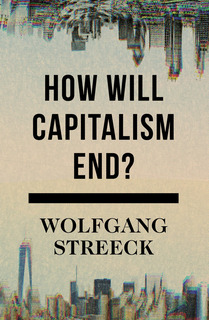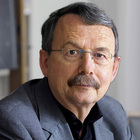 more images
image
more images
image
How Will Capitalism End?: Essays on a Failing System
In How Will Capitalism End?, the acclaimed analyst of contemporary politics and economics Wolfgang Streeck argues that the world is about to change. The marriage between democracy and capitalism, ill-suited partners brought together in the shadow of World War Two, is coming to an end. The regulatory institutions that once restrained the financial sector’s excesses have collapsed and, after the final victory of capitalism at the end of the Cold War, there is no political agency capable of rolling back the liberalization of the markets.
Ours has become a world defined by declining growth, oligarchic rule, a shrinking public sphere, institutional corruption and international anarchy, and no cure to these ills is at hand.
Reviews
-
“Streeck’s title question—though never answered—opens a window onto the conflict between capitalism and democracy in the neoliberal era. That such a conflict exists is no surprise in Brazil, and still hidden to many in the United States, but a rude and inescapable shock to those who grew up with the comfortable illusions and utopian hopes of post-war Europe.”
-
“Neoliberalism continues to delimit political choice across the globe yet it is clear that the doctrine is in severe crisis. In Wolfgang Streeck’s powerful new book How Will Capitalism End? Streeck demonstrates that the maladies afflicting the world—from secular stagnation to rising violent instability—herald not just the decline of neoliberalism, but what may prove to be the terminal phase of global capitalism.”
-
“At the heart our era’s deepening crisis there lies a touching faith that capitalism, free markets and democracy go hand in hand. Wolfgang Streeck’s new book deconstructs this myth, exposing the deeply illiberal, irrational, anti-humanist tendencies of contemporary capitalism.”
-
“An important and stimulating book. It is especially interesting in the light of fashionable preoccupations with secular stagnation, the march of robots and the lamentable performance of most leading economies since the onset of the financial crisis.”
-
“The most interesting person on the most urgent subject of our times”
-
“Streeck writes devastatingly and cogently … How Will Capitalism End? provides not so much a … forecast as a warning.”
-
“As the economic gloom deepens to the pitch black night of geopolitical crisis, in the economics departments of the world there can still be heard the confident chuckle: "but capitalism always survives". Wolfgang Streeck's book How Will Capitalism End? An extended riff on the possibility of the mainstream economists being wrong. Streeck synthesises the various strands of left crisis theory into a convincing proposal”
-
“Democratic capitalism is in bad shape. The crisis of 2007-09 and subsequent election of Donald Trump demonstrate that. In this book, German sociologist Streeck argues that capitalism is doomed, as many have before. But he does not believe it will be replaced by something better. Instead a new Dark Ages lies ahead.”
-
“This collection will be at the centre of social research for years to come”
-
“How Will Capitalism End? offers a powerful prognosis that predicts that the system will suffer a lingering death rather than go out with a bang...there are so many startling formulations of great analytic power in this book that it merits wide circulation in these troubled times.”
-
“The most interesting person around today on the subject of the relationship between democracy and capitalism”
-
“Streeck has become one of Europe's most sophisticated and pessimistic left-wing Euroskeptics...[his] criticism of the eurozone is powerful.”
Blog
-
Keynes 2030
In 1930, the economist John Maynard Keynes published a "letter to our grandchildren," in which he speculated about what kind of future industrial societies would have a hundred years later. Here Pascal Riché of L'obs interviews André Orléan, who has written a preface to this astonishing text. Translated by David Broder.

From an illustration by Edward McKnight Kauffer for The World in 2030 A.D. (1930) by the Earl of Birkenhead.
Les Liens qui libèrent have republished John Maynard Keynes’s odd little essay Economic Possibilities for Our Grandchildren, under the title Lettre à nos petits-enfants [Letter to Our Grandchildren]. Here Keynes journeyed a hundred years forward in order to imagine the society of the future. According to Keynes, by 2030 growth will have put an end to poverty. We will live in a society of abundance, in which we will work very little; an era in which "we prefer to devote our further energies to non-economic purposes." "The love of money … will be recognised for what it is, a somewhat disgusting morbidity." For André Orléan, the interest of this text lies in the break with capitalism that Keynes foresees therein.
Do you think this little text is a visionary one?
It really is an astonishing text. Here we discover that even at the end of the 1920s Keynes foresaw that economic activity would be "between four and eight times as high as it is today" a century later. And already today, in constant currency, the Western countries’ GDP is over four times higher than it was in 1930. This prediction is all the more remarkable given that he made it during a very troubled period — the crisis of 1929 — at a time when few statistics were available. To get a measure of the boldness of Keynes’s text, imagine the difficulties an economist today would face if she set out out to predict the level of development in a hundred years’ time. -
Red Sale 2017
A special Red Flash-Sale, 50% off these selected books (with free worldwide shipping) until Feb 15, midnight (UTC).
Click here to activate your discount.
-
In the Long Run We Are All Dead: Verso's Economics Bookshelf

“Before capitalism will go to hell, it will for the foreseeable future hang in limbo, dead or about to die from an overdose of itself but still very much around, as nobody will have the power to move its decaying body out of the way.” - Wolfgang Streeck
After years of ill health, capitalism is now in a critical condition. Growth has given way to stagnation; inequality is leading to instability; and confidence in the money economy has all but evaporated.
We present a reading list of titles that examine our current economic state, including Wolfgang Streeck's critically-acclaimed analysis, How Will Capitalism End? and Geoff Mann's provocative new book on Keynesianism, political economy, and revolution.
All these books are 40% off (with free shipping) until Feb 5th, midnight UTC. Click here to activate your discount.
Upcoming Events
-

April 04, 2017
Boston, MA
Boston University
How Will Capitalism End: Reflections on a Failing System
